Module 3 On the radio Unit 3 Language in use
文档属性
| 名称 | Module 3 On the radio Unit 3 Language in use |
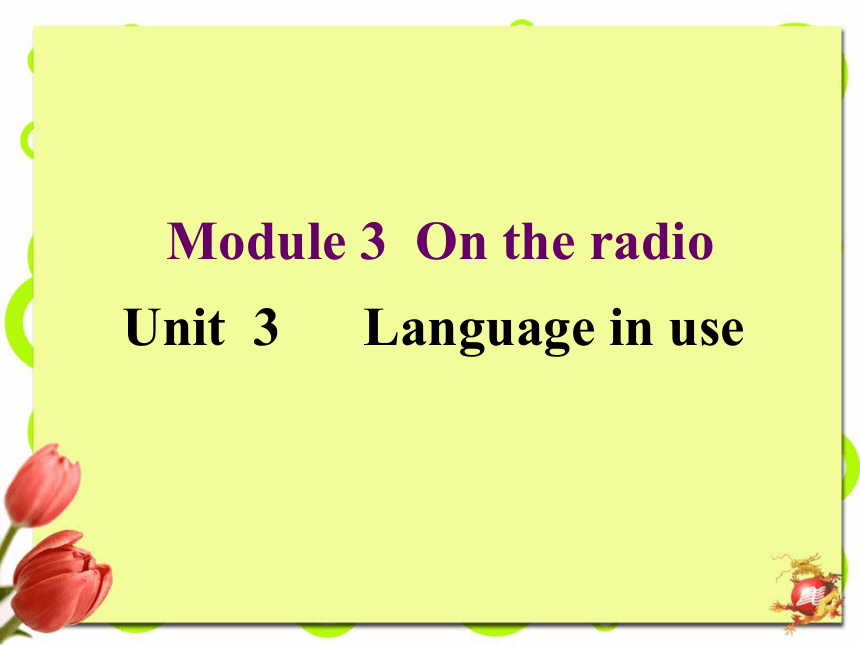
|
|
| 格式 | rar | ||
| 文件大小 | 963.1KB | ||
| 资源类型 | 教案 | ||
| 版本资源 | 外研版 | ||
| 科目 | 英语 | ||
| 更新时间 | 2011-08-09 00:00:00 | ||
图片预览

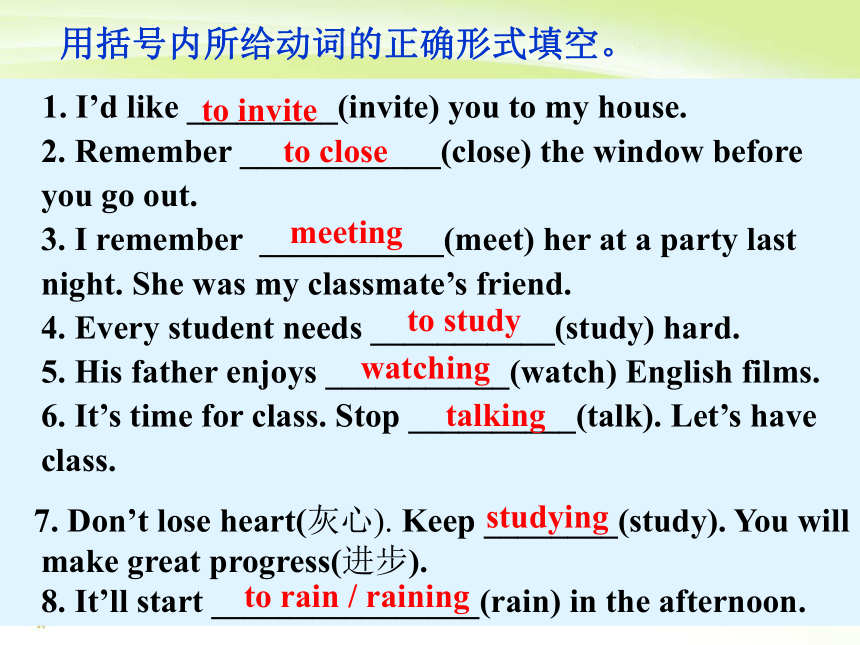
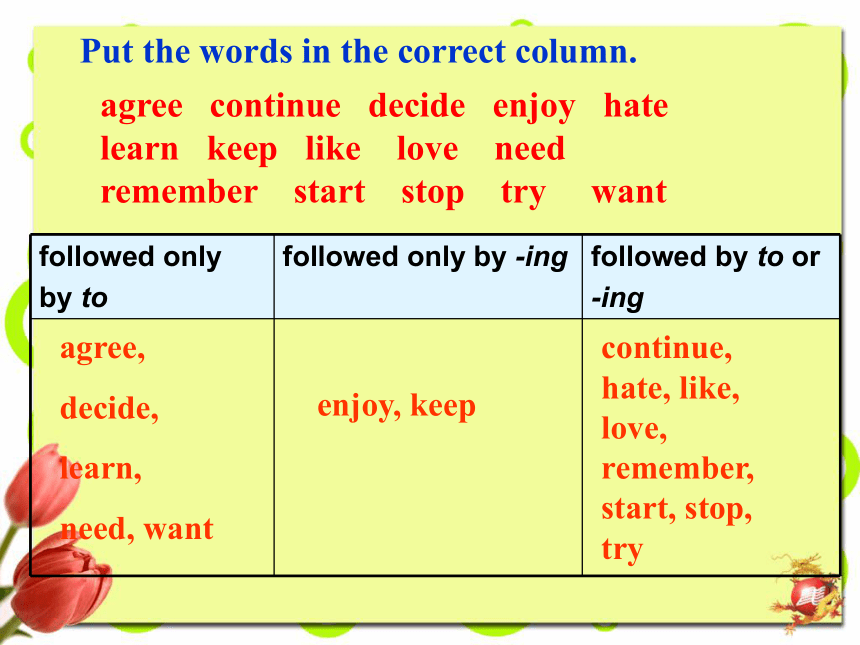
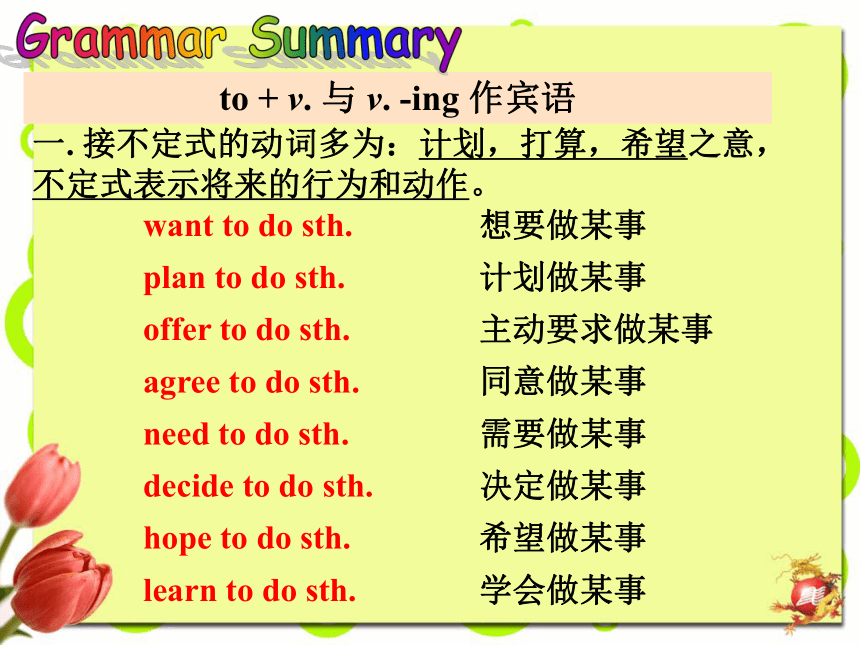
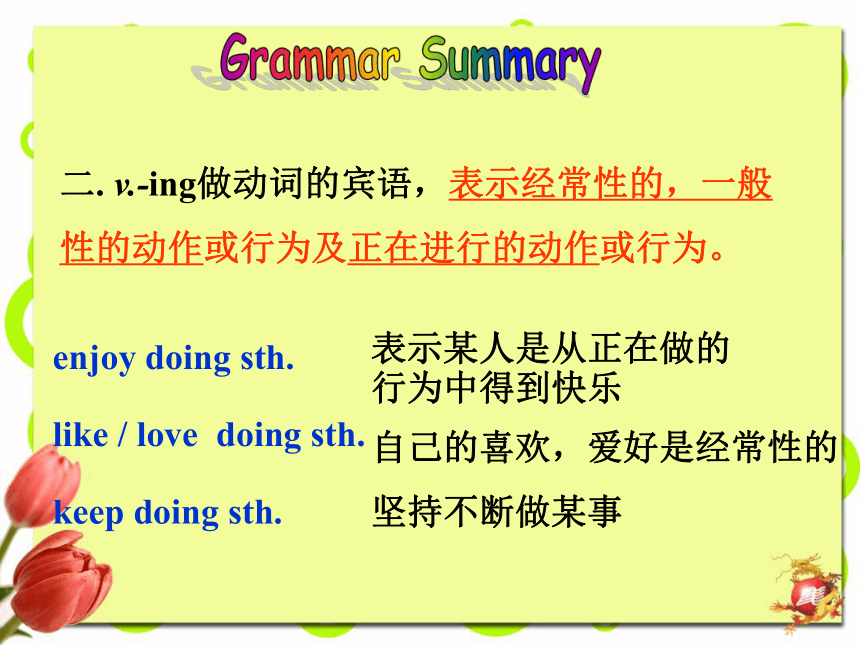
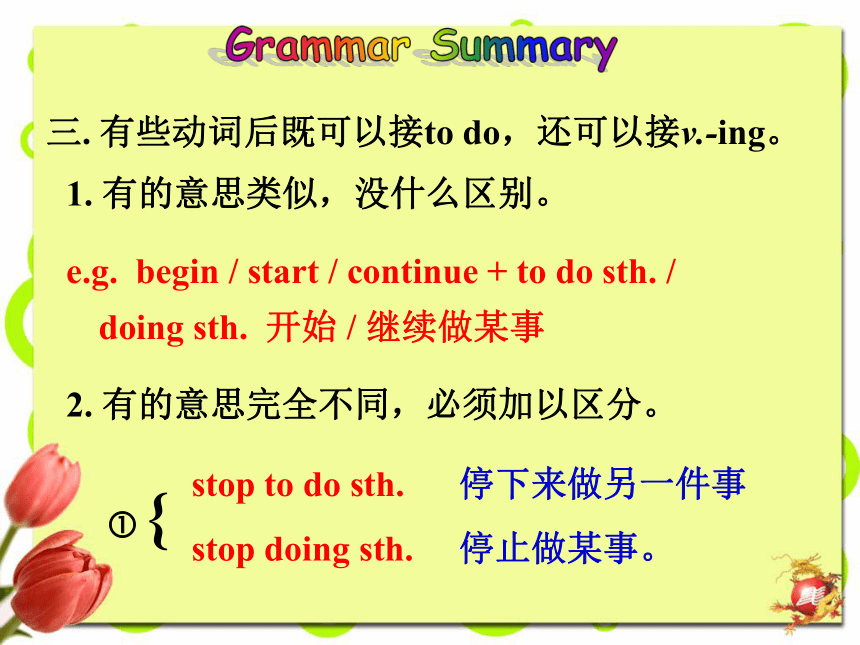
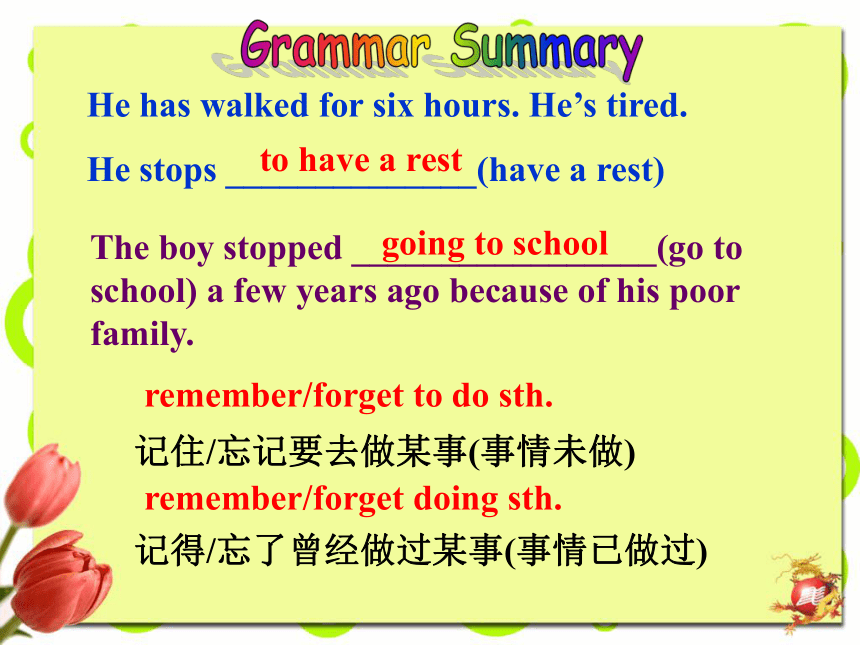
文档简介
(共18张PPT)
Module 3 On the radio Unit 3 Language in use
用括号内所给动词的正确形式填空。
1. I’d like _________(invite) you to my house. 2. Remember ____________(close) the window before you go out. 3. I remember ___________(meet) her at a party last night. She was my classmate’s friend. 4. Every student needs ___________(study) hard. 5. His father enjoys ___________(watch) English films. 6. It’s time for class. Stop __________(talk). Let’s have class.
7. Don’t lose heart(灰心). Keep ________(study). You will make great progress(进步). 8. It’ll start ________________(rain) in the afternoon.
to invite
to close
meeting
to study
watching
talking
studying
to rain / raining
followed only
by to followed only by -ing followed by to or
-ing
agree,
decide,
learn,
need, want
enjoy, keep
continue, hate, like, love, remember, start, stop, try
Put the words in the correct column.
agree continue decide enjoy hate learn keep like love need remember start stop try want
to + v. 与 v. -ing 作宾语
一. 接不定式的动词多为:计划,打算,希望之意,不定式表示将来的行为和动作。
want to do sth.
plan to do sth.
offer to do sth.
agree to do sth.
need to do sth.
decide to do sth.
hope to do sth.
learn to do sth.
想要做某事
计划做某事
主动要求做某事
同意做某事
需要做某事
决定做某事
希望做某事
学会做某事
二. v.-ing做动词的宾语,表示经常性的,一般性的动作或行为及正在进行的动作或行为。
enjoy doing sth.
like / love doing sth.
keep doing sth.
表示某人是从正在做的
行为中得到快乐
自己的喜欢,爱好是经常性的
坚持不断做某事
三. 有些动词后既可以接to do,还可以接v.-ing。
1. 有的意思类似,没什么区别。
e.g. begin / start / continue + to do sth. / doing sth. 开始 / 继续做某事
2. 有的意思完全不同,必须加以区分。
{
stop to do sth.
stop doing sth.
停下来做另一件事
停止做某事。
He has walked for six hours. He’s tired.
He stops ______________(have a rest)
The boy stopped _________________(go to school) a few years ago because of his poor family.
to have a rest
going to school
remember/forget to do sth.
remember/forget doing sth.
记住/忘记要去做某事(事情未做)
记得/忘了曾经做过某事(事情已做过)
{
Don’t forget ____________(close) the window when you go out.
I can’t remember ___________(meet) her last party.
to close
meeting
{
try to do sth.
try doing sth.
尽力,设法去做某事
尝试着做某事
{
Try _________(get) here early. Don’t be late.
Try _________(knock) at the back door if nobody hears you at the front door.
to get
knocking
3. 在love, like, hate 等词后, 用v.-ing 多表示一般性的,习惯性的动作,用不定式多表示一次具体的,特定条件下的动作.
{
He likes ___________(drink) tea, but he doesn’t like _________(drink) tonight.
My father hates _________(listen) to rock music, but he loved _________(listen) to it last Sunday.
drinking
to drink
listening
to listen
{
4. 感官动词 see, hear, watch, notice 等,后面接不带to的不定式(即动词原形)或v.-ing, 动词原形表示动作已经完成,强调从始至终的全过程;v.-ing强调动作正在进行。
{
I heard someone calling me downstairs.
I heard him call me many times.
我听见有人在楼下叫我。(正喊叫)
我听见他多次叫我。(叫了多次,过程已结束)
Complete the sentences with the correct form of the words.
I want our team ________(win). I like ________ (win)
1.Tony hates _______(see) his team lose. 2. Daming enjoys ________(listen) to music 3. They decided ________(visit) Radio Beijing with Sally. 4. They have to stop ________(talk) when the red light is on. 5. Keep ________(study) English if you want to work on Radio Beijing. 6. You need ________(speak) English to work in radio. 7. He started _______________(make) his own radio programme. 8. He remembers ________(get) his first job in radio. 9. He learnt ________(speak) on the radio.
to win
wining
seeing
listening
to visit
talking
studying
to speak
making/to make
getting
to speak
Choose the word which does not belong in each group.
article report newspaper reporter
sunny rain glass weather
score result match studio
presenter manager newsreader reporter
sport news job sunny
Complete the sentences with the correct form of the words and expressions in the box.
latest prepare rain result score sports
sunny weather weather report win
1. Did you listen to the _____________ What will the __________be like tomorrow 2. It’s going to be _______. It isn’t going to_______. 3.We can have a picnic! I’ll _______the food today. 4. It’s six o’clock. Let’s listen to the _______news to find out the _______of the football match. 5. Hey, our team _______three goals. They _______the match. That’s fantastic! 6. Do you like other _______as well as football
weather report
latest
sunny
rain
prepare
weather
result
scored
won
sports
Complete the passage with the phrases in the box.
I’m going to(1) ________________ the radio station. You must (2) ______________light. When it’s on, you have to be quiet. I know some of you (3)____________ work in radio. I’ll introduce you to the presenters an you can talk to them. This screen shows us what’s happening outside. We can’t(4) _____________the window, because there aren’t any windows. The first programme of the day starts at 5 am, and the station(5) ___________at 12pm. OK, that’s (6) ___________the tour. Has anyone got a question
closes down look out for look out of
take you around the end of would like to
take you around
look out for
would like to
look out of
closes down
the end of
The Clockwork Radio
British inventor, Trevor Baylis, was listening to a radio programme one day about health problems in Africa. He then realised how much a radio would help African people learn about health and health care. Electricity and batteries are expensive and hard to get in some parts of Africa, so he developed a clever radio that works without batteries or electricity. The clockwork or wind-up radio, first make in South African people. Even in tiny villages which had no electricity, or forms of communication, people began to listen to the radio, not only for entertainment, but educate themselves, too.
Answer the questions
1.What is Trevor Baylis
2.What does a radio help African people learn about
3.What did Trevor Baylis develop?
4.Did the clockwork radio change the lives of many African people
5.Why is it important the radio works on clockwork
6.Why did African people begin to listen to the radio
A British inventor.
Health and health care.
The Clockwork Radio.
Yes, it did.
Because it doesn’t require batteries or electricity.
Not only for entertainment ,but to educate themselves, too.
Finish workbook exercises 10, 11,&12.
Module 3 On the radio Unit 3 Language in use
用括号内所给动词的正确形式填空。
1. I’d like _________(invite) you to my house. 2. Remember ____________(close) the window before you go out. 3. I remember ___________(meet) her at a party last night. She was my classmate’s friend. 4. Every student needs ___________(study) hard. 5. His father enjoys ___________(watch) English films. 6. It’s time for class. Stop __________(talk). Let’s have class.
7. Don’t lose heart(灰心). Keep ________(study). You will make great progress(进步). 8. It’ll start ________________(rain) in the afternoon.
to invite
to close
meeting
to study
watching
talking
studying
to rain / raining
followed only
by to followed only by -ing followed by to or
-ing
agree,
decide,
learn,
need, want
enjoy, keep
continue, hate, like, love, remember, start, stop, try
Put the words in the correct column.
agree continue decide enjoy hate learn keep like love need remember start stop try want
to + v. 与 v. -ing 作宾语
一. 接不定式的动词多为:计划,打算,希望之意,不定式表示将来的行为和动作。
want to do sth.
plan to do sth.
offer to do sth.
agree to do sth.
need to do sth.
decide to do sth.
hope to do sth.
learn to do sth.
想要做某事
计划做某事
主动要求做某事
同意做某事
需要做某事
决定做某事
希望做某事
学会做某事
二. v.-ing做动词的宾语,表示经常性的,一般性的动作或行为及正在进行的动作或行为。
enjoy doing sth.
like / love doing sth.
keep doing sth.
表示某人是从正在做的
行为中得到快乐
自己的喜欢,爱好是经常性的
坚持不断做某事
三. 有些动词后既可以接to do,还可以接v.-ing。
1. 有的意思类似,没什么区别。
e.g. begin / start / continue + to do sth. / doing sth. 开始 / 继续做某事
2. 有的意思完全不同,必须加以区分。
{
stop to do sth.
stop doing sth.
停下来做另一件事
停止做某事。
He has walked for six hours. He’s tired.
He stops ______________(have a rest)
The boy stopped _________________(go to school) a few years ago because of his poor family.
to have a rest
going to school
remember/forget to do sth.
remember/forget doing sth.
记住/忘记要去做某事(事情未做)
记得/忘了曾经做过某事(事情已做过)
{
Don’t forget ____________(close) the window when you go out.
I can’t remember ___________(meet) her last party.
to close
meeting
{
try to do sth.
try doing sth.
尽力,设法去做某事
尝试着做某事
{
Try _________(get) here early. Don’t be late.
Try _________(knock) at the back door if nobody hears you at the front door.
to get
knocking
3. 在love, like, hate 等词后, 用v.-ing 多表示一般性的,习惯性的动作,用不定式多表示一次具体的,特定条件下的动作.
{
He likes ___________(drink) tea, but he doesn’t like _________(drink) tonight.
My father hates _________(listen) to rock music, but he loved _________(listen) to it last Sunday.
drinking
to drink
listening
to listen
{
4. 感官动词 see, hear, watch, notice 等,后面接不带to的不定式(即动词原形)或v.-ing, 动词原形表示动作已经完成,强调从始至终的全过程;v.-ing强调动作正在进行。
{
I heard someone calling me downstairs.
I heard him call me many times.
我听见有人在楼下叫我。(正喊叫)
我听见他多次叫我。(叫了多次,过程已结束)
Complete the sentences with the correct form of the words.
I want our team ________(win). I like ________ (win)
1.Tony hates _______(see) his team lose. 2. Daming enjoys ________(listen) to music 3. They decided ________(visit) Radio Beijing with Sally. 4. They have to stop ________(talk) when the red light is on. 5. Keep ________(study) English if you want to work on Radio Beijing. 6. You need ________(speak) English to work in radio. 7. He started _______________(make) his own radio programme. 8. He remembers ________(get) his first job in radio. 9. He learnt ________(speak) on the radio.
to win
wining
seeing
listening
to visit
talking
studying
to speak
making/to make
getting
to speak
Choose the word which does not belong in each group.
article report newspaper reporter
sunny rain glass weather
score result match studio
presenter manager newsreader reporter
sport news job sunny
Complete the sentences with the correct form of the words and expressions in the box.
latest prepare rain result score sports
sunny weather weather report win
1. Did you listen to the _____________ What will the __________be like tomorrow 2. It’s going to be _______. It isn’t going to_______. 3.We can have a picnic! I’ll _______the food today. 4. It’s six o’clock. Let’s listen to the _______news to find out the _______of the football match. 5. Hey, our team _______three goals. They _______the match. That’s fantastic! 6. Do you like other _______as well as football
weather report
latest
sunny
rain
prepare
weather
result
scored
won
sports
Complete the passage with the phrases in the box.
I’m going to(1) ________________ the radio station. You must (2) ______________light. When it’s on, you have to be quiet. I know some of you (3)____________ work in radio. I’ll introduce you to the presenters an you can talk to them. This screen shows us what’s happening outside. We can’t(4) _____________the window, because there aren’t any windows. The first programme of the day starts at 5 am, and the station(5) ___________at 12pm. OK, that’s (6) ___________the tour. Has anyone got a question
closes down look out for look out of
take you around the end of would like to
take you around
look out for
would like to
look out of
closes down
the end of
The Clockwork Radio
British inventor, Trevor Baylis, was listening to a radio programme one day about health problems in Africa. He then realised how much a radio would help African people learn about health and health care. Electricity and batteries are expensive and hard to get in some parts of Africa, so he developed a clever radio that works without batteries or electricity. The clockwork or wind-up radio, first make in South African people. Even in tiny villages which had no electricity, or forms of communication, people began to listen to the radio, not only for entertainment, but educate themselves, too.
Answer the questions
1.What is Trevor Baylis
2.What does a radio help African people learn about
3.What did Trevor Baylis develop?
4.Did the clockwork radio change the lives of many African people
5.Why is it important the radio works on clockwork
6.Why did African people begin to listen to the radio
A British inventor.
Health and health care.
The Clockwork Radio.
Yes, it did.
Because it doesn’t require batteries or electricity.
Not only for entertainment ,but to educate themselves, too.
Finish workbook exercises 10, 11,&12.
同课章节目录
- Module 1 Feelings and impressions
- Unit 1 It smells delicious.
- Unit 2 I feel nervous when I speak Chinese .
- Unit 3 Language in use
- Module 2 Experiences
- Unit 1 I've also entered lots of speaking competi
- Unit 2 They have seen the Pyramids.
- Unit 3 Language in use
- Module 3 Journey to space
- Unit 1 Has it arrived yet?
- Unit 2 We have not found life on any other planet
- Unit 3 Language in use
- Module 4 Seeing the docto
- Unit 1 I haven't done much exercise since I got m
- Unit 2 We have played football for a year now
- Unit 3 Language in use
- Module 5 Cartoons
- Unit 1 It's time to watch a cartoon.
- Unit 2 Tintin has been popular for over eighty yea
- Unit 3 Language in use
- Revision module A
- Module 6 Hobbies
- Unit 1 Do you collect anything ?
- Unit 2 Hobbies can make you grow as a person.
- Unit 3 Language in use
- Module 7 Summer in Los Angeles
- Unit 1 Please write to me and send me some photos
- Unit 2 Fill out a form and come to learn English
- Unit 3 Language in use
- Module 8 Time off
- Unit 1 I can hardly believe we are in the city ce
- Unit 2 We thought somebody was moving about
- Unit 3 Language in use
- Module 9 Friendship
- Unit 1 Could I ask if you've mentioned this to he
- Unit 2 I believe that the world is what you think
- Unit 3 Language in use
- Module 10 On the radio
- Unit 1 I hope that you can join us one day
- Unit 2 It seemed that they were speaking to me in
- Unit 3 Language in use
- Revision module B
